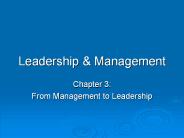Leadership - PowerPoint PPT Presentation
1 / 16
Title:
Leadership
Description:
Strategic leadership is the process of providing the direction and inspiration ... such goals as innovation, nonduplication of effort, and competitive advantage ... – PowerPoint PPT presentation
Number of Views:50
Avg rating:3.0/5.0
Title: Leadership
1
Leadership
- Chapter Thirteen
- Strategic Leadership and Knowledge Management
2
The Nature of Strategic Leadership
Strategic leadership is the process of providing
the direction and inspiration necessary to create
or sustain an organization
3
Figure 13-1 Components of Strategic Leadership
4
Systems Thinking
The ability to process information and understand
its consequences for the organization in its
interaction with the environment
5
Strategic Planning
- Strategic planning encompasses those activities
that lead to the statement of goals and
objectives and the choice of strategy - Strategic planning often takes the form of a SWOT
analysis, a method of considering strengths,
weaknesses, opportunities, and threats in a
particular situation
6
SWOT Analysis
- Represents an effort to examine the interaction
between the particular characteristics of an
organization or organizational unit and the
external environment
7
Examples of SWOT Elements
- Strengths Favorable location, talented workers,
state-of-the-art equipment - Weaknesses Unfavorable location, outdated
equipment, limited capital - Opportunities Culturally diverse customer base,
changes in technology, deregulation - Threats Ecommerce, declining market, new
competitors
8
(No Transcript)
9
Business Strategy Levels
- Corporate-level strategy asks, What business are
we in? - Business-level strategy asks, How do we
compete? - Functional-level strategy asks, How do we
support the business-level strategy?
10
Sample Strategies
- Differentiation
- Cost leadership
- Focus
- High quality
- Imitation
- Strategic alliances
- Growth through acquisition
11
(No Transcript)
12
Sample Strategies (contd)
- High speed and first-mover strategy
- Product and global diversification
- Sticking to core competencies
- Brand leadership
- Creating demand by solving problems
- Conducting business on the Internet
- Peoplepalooza (competitive advantage through
hiring talented people)
13
Knowledge Management andthe Learning Organization
- Knowledge management is the systematic sharing of
information to achieve such goals as innovation,
nonduplication of effort, and competitive
advantage - A learning organization is one that is skilled at
creating, acquiring, and transferring knowledge,
and at modifying behavior to reflect new
knowledge and insights
14
Figure 13-2 Where Corporate Knowledge Lives
15
Initiatives to Enhance Organizational Learning
- Create a strategic intent to learn
- Create a shared vision
- Empower employees to make decisions and seek
continuous improvement - Develop systems thinking
- Encourage personal mastery of the job
16
Initiatives to Enhance Organizational Learning
(contd)
- Encourage team learning
- Encourage action learning
- Learn from failure
- Encourage continuous experimentation
- Develop political skills to make connections with
and influence others - Encourage creative thinking































